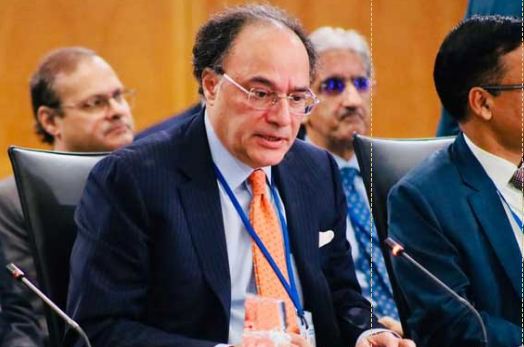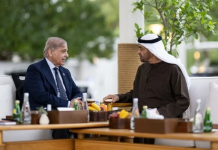ISLAMABAD, OCT 19: Finance Minister Muhammad Aurangzeb has said that the International Monetary Fund (IMF) cannot impose any condition that goes against Pakistan’s national interest, stressing that all ongoing economic reforms are guided by the country’s own priorities.
“The IMF cannot put any condition that goes against Pakistan’s national interest,” said Aurangzeb while addressing a press conference in Washington, where he was accompanied by other senior officials.
Finance czar said that the reforms introduced under the IMF programme had played a vital role in stabilising Pakistan’s economy. “[The] steps we took under the IMF arrangement have strengthened the economy and built confidence,” he said.
The finance minister added that Pakistan expects to receive the next IMF tranche of $1.2 billion by December 31, noting that the IMF Executive Board is expected to approve the agreement soon. “We anticipate the board’s approval shortly, which will pave the way for the disbursement,” he stated.
He further said that a trade and tariff agreement with US was expected within the next two weeks.
Discussing Pakistan’s privatisation plans, Aurangzeb confirmed that the government was close to a decision on the privatisation of New York’s Roosevelt Hotel.
Meanwhile, Aurangzeb, on the sixth and final day of his visit to the US, continued his engagements and witnessed the signing of a swap agreement between the State Bank of Pakistan (SBP) and the International Finance Corporation (IFC).
The signing took place during his meeting with IFC Managing Director Makhtar Diop on the sidelines of the IMF–World Bank Annual Meetings in Washington, DC.
The finance minister hailed IFC’s recent reorganisation, which has designated Pakistan as a regional hub, calling it a strong vote of confidence in the country’s rising economic potential.
He also reaffirmed the government’s commitment to strengthening its partnership with the IFC across key development and financial sectors.
Highlighting progress on the Reko Diq project, Senator Aurangzeb expressed optimism about the EXIM Bank’s participation in the near future.
He further appreciated IFC’s continued support for subnational finance and Digital Payment Rights (DPR) initiatives, as well as its advisory role in sectors such as pharmaceuticals, electric vehicles, and commodity exchanges.
The FinMin also welcomed Diop’s upcoming visit to Pakistan around the Spring Meetings, expressing confidence that it would further strengthen Pakistan–IFC collaboration.
Meanwhile, Aurangzeb also participated in the 15th V20 Ministerial Dialogue on “Cost of Capital, Debt & Growth Pathways.”
In his address, he highlighted the increasing frequency and intensity of devastating floods in Pakistan, emphasising that the Government continues to fund rescue and relief operations from its own resources.
He appreciated the support extended by the CVF–V20 Secretariat in assisting Pakistan with the preparation of its Climate Prosperity Plan (CPP), and informed that financing is being made available under the Country Partnership Framework (CPF) to operationalise the plan.
Senator Aurangzeb also underscored the need to operationalise the Loss and Damage Fund and called for fast-tracking decision-making processes at the Green Climate Fund (GCF) to ensure timely and effective climate action for vulnerable countries.
The finance czar also called on the senior management of JP Morgan on the sidelines of the IMF–World Bank Annual Meetings in Washington, DC.
Hd briefed the JP Morgan team on Pakistan’s upcoming inaugural issuance of the Panda Bond in the Chinese market, noting that it would be launched as a green bond to support sustainable financing objectives.
He also provided a detailed overview of the government’s privatisation programme, highlighting the Cabinet-approved government-to-government (G2G) sale of the First Women Bank.
Senator Aurangzeb informed the team that several US companies had expressed interest in the Reko Diq project and that the government looked forward to the participation of EXIM Bank in the syndication process.
He also highlighted the ongoing digital collaboration between Saudi Arabia and Pakistan through the GO AI Hub initiative, which aims to advance innovation and technology-driven development.
The finance minister encouraged JP Morgan to explore additional avenues of cooperation with Pakistan in areas of mutual interest, including sustainable finance, investment facilitation, and digital transformation.

















